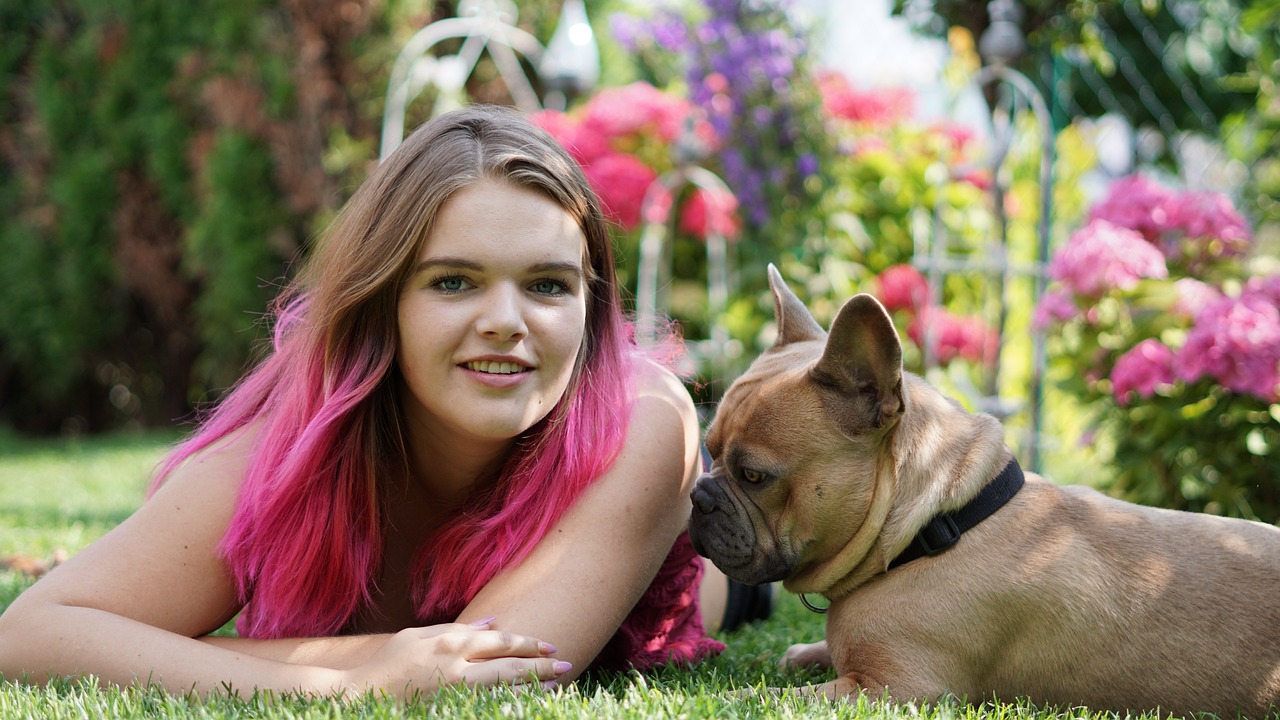We all know that a human pregnancy lasts about nine months. But how does that compare to your beloved pet, the wonderful French Bulldog? Have you ever wondered how long are French bulldogs pregnant?
If this is your first time breeding your female Frenchie, or if there’s been an unexpected “accident,” then this article is just what you need! The valuable insights we provide here will help you be ready for the big day. Our team has guided many dogs through pregnancy, and there’s nothing more fulfilling than greeting a new litter of puppies. Read on—here’s everything you need to know about French Bulldog gestation.
So, How Long Are French Bulldogs Pregnant?

French Bulldogs are typically pregnant for 58-63 days, with the average pregnancy lasting around 63 days from the date of conception. However, it’s important to note that this timeline can vary slightly from dog to dog. The precise duration of a French Bulldog’s pregnancy depends on several key factors:
- Litter size: The number of puppies can influence the length of pregnancy. Larger litters may be born slightly earlier than smaller ones, as the uterus becomes more crowded and triggers labor sooner.
- Maternal age: First-time mothers might carry their puppies slightly longer than experienced mothers. Additionally, very young or older Frenchies may have slightly different gestation periods.
- Genetic factors: Individual genetic variations can affect pregnancy duration, just as they do in humans. Some bloodlines may consistently carry puppies for slightly longer or shorter periods.
- Health status: The mother’s overall health and any underlying medical conditions can impact the length of pregnancy. Well-maintained health often results in more predictable gestation periods.
Read more >> French Bulldogs In Heat
Stages of French Bulldog Pregnancy
Understanding the journey of your French Bulldog’s pregnancy helps you provide appropriate care and know what to expect at each stage. Let’s break down this remarkable nine-week journey into three main stages, each with its own distinct characteristics and care requirements.
Early Stage (Weeks 1-3)
During the first three weeks, your French Bulldog will show few outward signs of pregnancy, though significant developments are happening internally. In week one, the fertilized eggs begin their journey toward the uterus, while your Frenchie appears completely normal. By week two, these tiny embryos embed themselves in the uterine lining – you might notice your dog becoming slightly more affectionate or clingy.
The third week brings the first hints of pregnancy. Some French Bulldogs experience mild morning sickness, similar to humans. You might notice your pet turning her nose up at food she usually enjoys or seeming more tired than usual. Don’t worry if she naps more frequently – her body is working hard to support the developing embryos.
Middle Stage (Weeks 4-6)

The middle stage is when pregnancy becomes more evident, both in your Frenchie’s appearance and behavior. By week four, her appetite typically returns with enthusiasm, and you’ll notice her nipples becoming more pronounced and possibly darker in color. This is an excellent time to begin transitioning to a pregnancy-specific diet under veterinary guidance.
Week five marks significant physical changes – your French Bulldog’s belly will start to expand noticeably, especially toward the end of this week. She might become more particular about being touched around her growing abdomen. During week six, the puppies develop rapidly, with distinct features forming. Your vet can usually confirm pregnancy through gentle palpation at this stage, though an ultrasound offers a clearer picture of the developing litter.
Late Stage (Weeks 7-9)
The final three weeks of pregnancy bring dramatic changes as your French Bulldog prepares for motherhood. Week seven often reveals the first visible signs of puppy movement – you might notice rippling movements across your dog’s belly, especially when she’s resting. Her appetite may increase significantly as she needs extra energy to support her growing puppies.
By week eight, your Frenchie will likely start exhibiting nesting behaviors. She might scratch at blankets or seek out quiet, secluded spots in your home. This is the perfect time to introduce her to the whelping box you’ve prepared. Her belly will be quite large now, and she may walk with a distinctive waddle.
The final week is crucial for preparation. Your French Bulldog’s appetite might decrease as the puppies take up more space internally. She’ll likely become restless and may pant more frequently. Watch for signs of impending labor, such as a drop in body temperature below 100°F, which typically indicates delivery within 24 hours. Some dogs become clingy during this time, while others prefer solitude – respect her preferences while keeping a watchful eye on her condition.
Caring for Your Pregnant French Bulldog
Ensuring a healthy pregnancy for your French Bulldog requires attention to several key aspects of care. From proper nutrition to preparing for delivery, each element plays a vital role in supporting your pet through this special time. Here’s a comprehensive guide to caring for your pregnant Frenchie.
Nutrition and Dietary Requirements
Your pregnant French Bulldog’s nutritional needs will change throughout her pregnancy. During the first four weeks, keep feeding her high-quality food for adult French Bulldogs, but gradually increase portions as her pregnancy progresses. By week five, switch to premium puppy food, which provides extra calories and nutrients essential for fetal development. Divide her daily meals into 3-4 smaller portions to prevent stomach discomfort from the growing puppies pressing against her digestive system. Ensure fresh water is always available, as pregnant dogs need more hydration than usual.
Exercise and Activity Guidelines
While exercise remains important during pregnancy, you’ll need to modify your Frenchie’s routine. During the first month, maintain regular walks but avoid strenuous activities. As her pregnancy progresses, decrease exercise intensity while keeping walks shorter and more frequent. By the final three weeks, limit exercise to gentle walks in cool weather and supervised bathroom breaks. Never allow jumping or rough play, which could harm the developing puppies. Watch for signs of fatigue, and let your dog set the pace.
Veterinary Care Schedule
Regular veterinary check-ups are crucial throughout pregnancy. Schedule an initial visit as soon as you suspect pregnancy for confirmation and health screening. Follow-up appointments should occur every two weeks initially, increasing to weekly visits in the final month. Your vet will monitor vital signs, check for potential complications, and may recommend ultrasounds or X-rays to assess the litter size. Keep vaccination records updated, as some vaccines are safe during pregnancy while others should be avoided.
Creating a Comfortable Environment
As your French Bulldog’s due date approaches, prepare a quiet, warm space for her to nest. Set up the whelping box in a low-traffic area away from other pets. Line it with clean, washable bedding and ensure the space is draft-free. Maintain room temperature between 72-78°F (22-26°C), as pregnant Frenchies are sensitive to temperature extremes. Familiarize her with the whelping area early, allowing her to enter and exit freely while becoming comfortable with the space.
Monitoring Health and Behavior

Keep a daily log of your French Bulldog’s temperature, behavior, and eating habits, especially in the final two weeks. Normal temperature ranges from 101-102.5°F (38.3-39.2°C). Watch for signs of distress such as excessive panting, restlessness, or loss of appetite. Monitor weight gain – most French Bulldogs gain 20-30% of their pre-pregnancy weight. Note any unusual discharge, vomiting, or dramatic behavior changes, as these may indicate complications requiring veterinary attention.
Preparing for Labor and Delivery
Gather essential supplies at least two weeks before the due date. Your whelping kit should include clean towels, sterile scissors, dental floss (for tying umbilical cords if necessary), heating pad, bulb syringe for clearing airways, and your vet’s emergency contact information. Learn to recognize labor signs: restlessness, nesting behavior, loss of appetite, and temperature dropping below 100°F. Many French Bulldogs require C-sections due to their narrow hips, so discuss delivery options with your vet well in advance.
Frequently Asked Questions
Q: How many puppies do French Bulldogs usually have?
A: French Bulldogs typically have 2-4 puppies per litter, though some may have up to 5 puppies. Due to their narrow hips, most Frenchies require C-sections for delivery.
Q: At what age can French Bulldogs get pregnant?
A: Female French Bulldogs can become pregnant as early as 6 months old, but breeding should wait until they’re fully mature at around 2-3 years of age to ensure the health of both mother and puppies.
Q: How can I tell if my French Bulldog is pregnant?
A: Early signs include decreased appetite, behavioral changes, and nipple enlargement. Confirmation through veterinary examination, usually via ultrasound at around 25-35 days, is recommended.
Conclusion
Understanding the timeline and care requirements of French Bulldog pregnancy is crucial for ensuring a healthy outcome for both mother and puppies. While the average pregnancy lasts 63 days, being prepared for the entire journey – from conception to birth – involves careful monitoring, proper nutrition, and appropriate veterinary care. By following these guidelines and working closely with your veterinarian, you can help ensure a successful pregnancy for your French Bulldog.

As an experienced dog foster and canine advocate, I have a special place in my heart for French Bulldogs. Their charming personalities and unique needs sparked my interest, leading me to specialize in Frenchie care. I’ve fostered over 200 Frenchies over the year, gaining deep insights into their dietary requirements and health concerns. This expertise drives my contributions to bestfoodforfrenchbulldog.dog, where I share practical advice on nutrition, care, and enrichment for these lovable flat-faced pups.
My articles aim to educate Frenchie owners on optimal feeding practices and health management. When not writing or fostering, I’m often cuddling with my own Frenchie, Biscuit, my inspiration for helping others care for this delightful breed.

